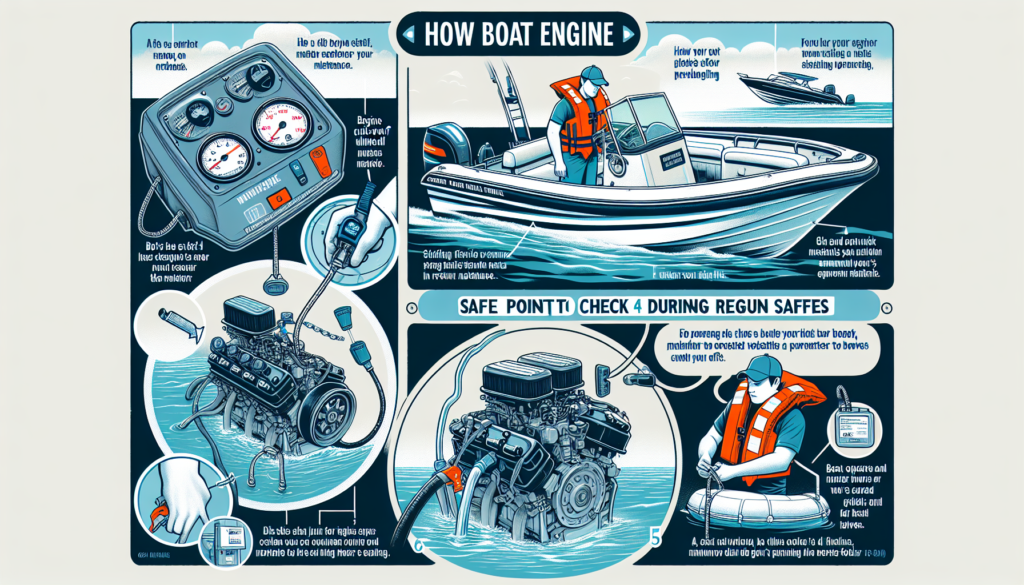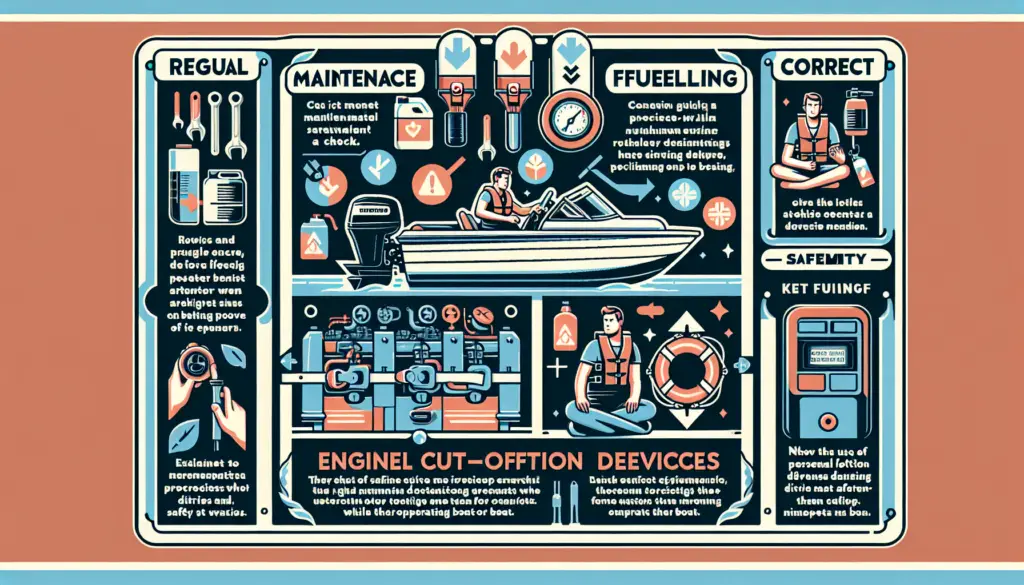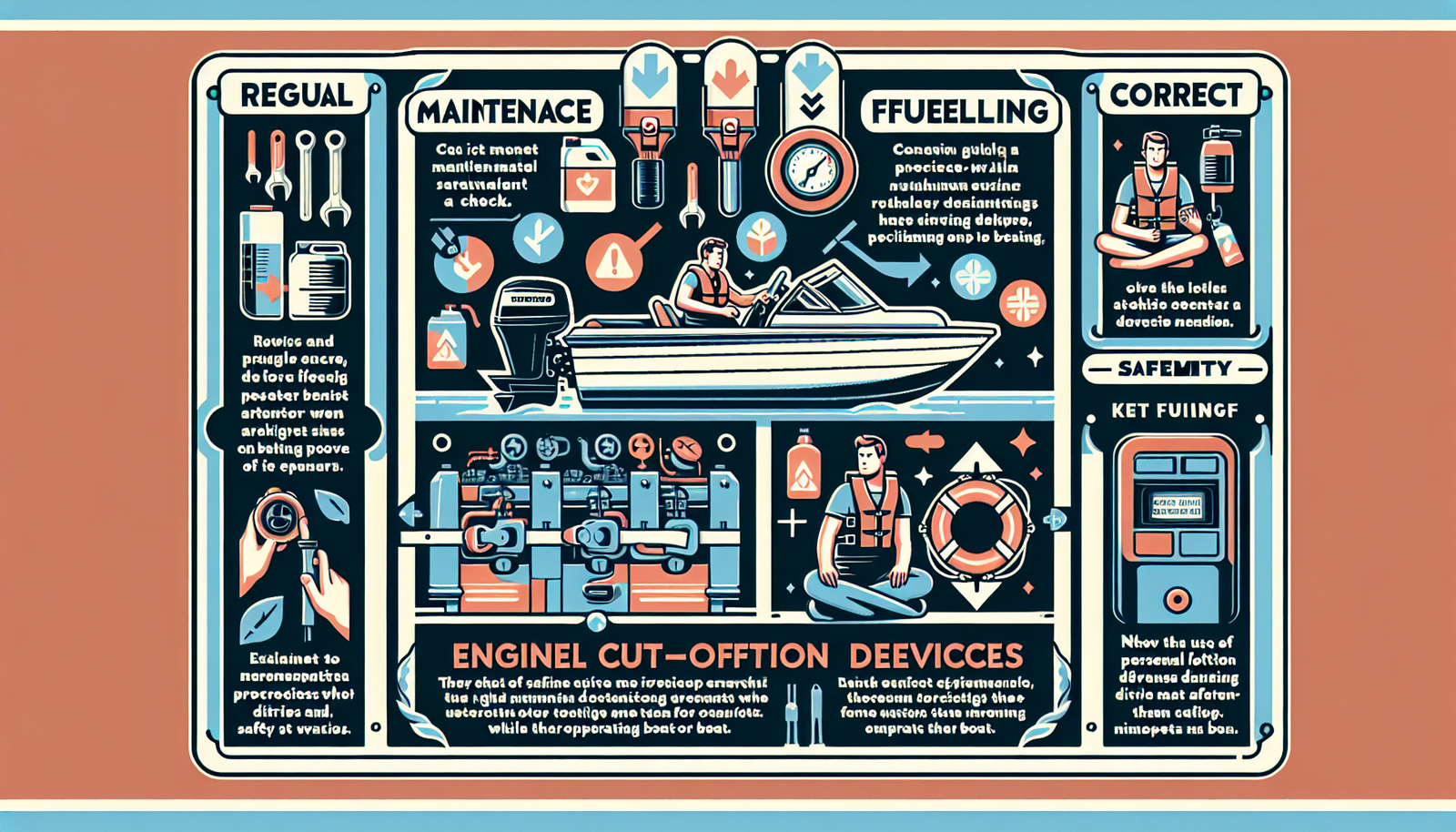Navigating the seas with your boat can be a thrilling adventure. But equally important is knowing how to keep your boat’s engine in tip-top condition to avoid dangerous situations. “The Top Boat Engine Safety Tips Every Owner Should Follow” offers you vital insights into maintaining your boat’s engine to ensure your safety, and that of your beloved boat. This piece will guide you with practical tips to help you keep your engine running smoothly, prolong its lifespan, and most importantly, ensure your maritime journeys remain safe and enjoyable. So tighten your lifejackets, because it’s time for smooth sailing as you learn to master your boat engine’s safety.

Understanding Your Boat Engine
Boating is more than a leisure activity; it’s an art that requires a sound understanding of various aspects including, notably, your boat engine. Just like driving a car, being able to navigate a boat efficiently and safely necessitates a deep knowledge and appreciation for the ‘heart’ that fuels your vessel – the engine. From knowing the fundamentals about marine engines to understanding the critical parts, it’s all about learning and ultimately becoming a proficient boat handler.
Basics of Marine Engines
Marine engines are diverse, but the basics remain the same. Your boat engine is effectively a motor that converts fuel or other forms of energy into mechanical power, propelling your vessel forward through the water. It’s important to know the fundamental operation of your engine, including the combustion process, cooling, and exhaust dispersal, to maintain efficiency and diagnose problems when they arise.
Differences between Marine and Car Engines
At first glance, you might think that a marine engine is more or less the same as the one that powers your car – but there are key differences. In a car engine, fresh air is used for cooling while a marine engine uses water, given the marine environment. Also, marine engines are designed to run for extended periods at full speed, unlike car engines that usually operate at a wide range of speeds.
Types of Boat Engines
Boat engines come in various types such as outboard, inboard, and sterndrive engines. Outboard motors, which are found on the outside of the boat, are the most common for recreational boating. In contrast, inboard motors are built into the boat and sterndrive engines are a hybrid of the two, offering the best of both worlds.
Recognizing Common Engine Parts
Knowing the key parts of your boat engine helps you communicate effectively with mechanics and identify issues early. The most critical parts include the combustion chamber where the fuel-air mix burns, the cooling system that keeps the engine at optimal temperature, the exhaust system to eliminate waste gases, and the fuel system for supplying the fuel-air mixture.
Routine Maintenance Practices
An engine is like the human body – it needs regular check-ups and care. Here’s why routine engine maintenance practices are essential, and what they include.
Importance of Regular Engine Check ups
Regular engine check-ups are all about prevention. They’re about diagnosing and rectifying minor problems before they escalate into major issues requiring costly repairs. Regular check-ups also ensure your engine performs at its best, providing maximum fuel efficiency and power.
Boat Engine Cleaning Tips
A clean engine is likely a healthy one. Use a soft, lint-free cloth to remove loose dirt and then use an appropriate engine cleaner to remove grime and grease. Ensure you follow the manufacturer’s instructions in order not to damage sensitive parts.
Lubrication of Engine Parts
Lubrication is critical in reducing friction between moving parts, preventing wear and tear. It’s important to use the recommended oil or lubricant and ensure it’s applied to the right components, such as the spark plug threads and cylinder heads.
Replacing Engine Filters
Another core aspect of engine maintenance is replacing filters. Air and fuel filters prevent particles from getting into the combustion chamber, protecting your engine. Over time, these filters clog, reducing their effectiveness. Replacing them regularly keeps your engine running smoothly.
Keeping Up with Oil Changes
Regular oil changes are essential for the longevity of your engine. Over time, oil breaks down and gets contaminated, reducing its ability to lubricate and cool engine parts effectively. Check your engine manual for recommended oil change intervals.
Fuel Safety
Dealing with fuel requires caution and knowledge. Here’s why fuel safety is important and how to maintain it.
Proper Fuel Storage
Proper fuel storage is crucial for safety. Store fuel in approved containers, away from direct sunlight and sources of heat or ignition. Make sure to keep it away from living spaces and children, as well.
Safe Refueling Practices
When refueling your boat, ensure the engine is turned off, all passengers have disembarked, and there are no open flames or smokes. Use a spill-proof fuel can to minimize the risk of spills and don’t overfill the fuel tank.
Using the Right Fuel Type
Always use the fuel type recommended by your boat’s manufacturer. Using the wrong fuel can degrade engine performance, damage the engine, and even lead to dangerous situations such as explosions.
How to Spot and Deal with Fuel Leaks
Fuel leaks can be potentially dangerous. You might smell fuel, see a sheen on the water, or spot drips. Always handle with care, try to find the source, and if in doubt, contact a professional.

Ventilation and Exhaust Systems
A well-ventilated engine compartment ensures that fresh air is constantly supplied to your engine and harmful gases are effectively expelled.
Importance of Good Ventilation
Without good ventilation, harmful gases like carbon monoxide can build up in the engine compartment, creating a risk of explosion or poisoning. Good ventilation also cools the engine and keeps it running efficiently.
Recognizing Signs of Poor Ventilation
Note any musty smells, overheating, or poor engine performance. Visual cues, like buildup of exhaust soot, can also signal issues.
Maintaining the Exhaust Systems
Regular inspections are vital for the maintenance of your boat’s exhaust systems. These checks involve looking out for leaks, corroded parts, and blockages.
Preventing Carbon Monoxide Poisoning
Carbon monoxide is an odorless, colorless gas that can cause serious health problems or death. Install carbon monoxide detectors on your boat and make sure to keep living areas well-ventilated.
Ignition and Electrical Systems
Understanding your boat’s ignition and electrical systems is fundamental to its operation and safety.
Understanding the Ignition System
The ignition system includes the battery, ignition switch, spark plug, and ignition coil. The system is responsible for igniting the fuel-air mixture in the combustion chamber.
Proper Care for Electrical Wires and Connections
Check wires and connections regularly for damage or corrosion. Loose connections should be tightened and worn-out components replaced by a professional.
Safety Measures When Working with Boat Electrics
Never work on the electrical system while the engine is running or while you’re wet. Use insulated tools and always disconnect the battery before working on the electrical system.
Backup System Considerations
Having a redundant ignition system or backup battery can be a great safety measure in case of primary system failure.
Battery Care and Maintenance
The boat’s battery is also important and needs to be properly cared for.
Proper Boat Battery Storage and Cleaning
When not in use, store the boat battery in a cool, dry place. Clean terminals regularly to prevent corrosion.
Knowing When to Change Your Boat Battery
If the battery can’t hold charge, struggles to start the engine, or is more than three to five years old, it’s time for a replacement.
Dealing with Battery Leaks
Battery leaks can damage the boat and pose a safety hazard. If a leak is spotted, use gloves to remove the battery and clean the area with baking soda and water to neutralize the acid.
Proper Disposal of Used Batteries
Used batteries contain harmful chemicals and should be disposed of properly. Most battery retailers offer recycling services.
Water Pump and Cooling System
A functioning water pump and cooling system are fundamental to the efficient operation of your boat’s engine.
Understanding the Water Pump and its Components
The water pump circulates water through the engine to cool it down. Key components include the impeller, housing, and gaskets.
Routine Checks for the Cooling System
Regularly check for leaks, rust, or corrosion. Also, monitor temperature gauges to ensure the system is working properly.
How to Spot Potential Cooling System Issues
Overheating, coolant leaks, and engine misfires are possible signs of cooling system problems.
Proper Maintenance Steps for Water Pump and Cooling Systems
Maintain by regularly replacing the coolant, checking hoses for damage, and replacing the impeller yearly.
Winterizing Your Boat Engine
Boat engine winterization is a crucial step in ensuring the longevity and functionality of your engine in cold climates.
Understanding the Concept of Boat Winterization
Winterization involves preparing your boat and its engine for extended periods of inactivity during freezing weather.
How to Winterize Your Boat Engine
Procedures can include draining the fuel and water systems, applying a fogging spray to the engine, and adding antifreeze.
Importance of Winterization for Engine Lifespan
Winterization protects your engine from freezing temperatures, preventing damage that can shorten its lifespan.
Options if You Can’t Winterize Your Boat
If you can’t winterize your boat, consider storing it in a heated indoor storage facility or hiring a professional to do it for you.
Emergency Situations
Even with the best care and maintenance, things can still go wrong.
Preparing for Mechanical Breakdowns
Always carry a basic toolkit, replacement parts, and a manual for your engine.
What to Do in Case of Engine Overheating
Turn off the engine immediately and allow it to cool. Check the water pump, impeller, and cooling system for blockages or leaks.
Handling Fuel Leaks and Fire
If you suspect a leak, stop the engine, ventilate the area, and try to locate and fix the leak. In a fire, shut off the fuel source, alert all passengers, and use the fire extinguisher.
How to Tackle an Engine Failure on Open Water
Stay calm and assess the situation. Try to troubleshoot the problem based on what you know. If you can’t fix the issue, call for assistance.
Educating Passengers about Boat Engine Safety
Passenger education is key to maintaining safety on board.
Briefing Passengers About Boat Engine Operations
During your safety briefing, explain the basics of how the boat operates and discuss your safety procedures.
Teaching Proper Usage of Safety Equipment
Make sure your passengers know where the life jackets and emergency equipment are located and how to use them.
Importance of Clarity in Emergency Procedures
Ensure your passengers understand what to do in the event of an emergency. Clarity and understanding can save lives.
Encouraging Responsiveness, Not Panic in Emergencies
Keeping a cool head is crucial in crisis scenarios. Encourage passengers to stay calm and follow the established procedures.
By understanding and caring for your boat engine, regular maintenance, and prioritizing safe conduct, you ensure that you can handle any situation that comes your way on the water. Here’s to many more happy and safe boating journeys!

